外研版(2019)必修第一册Unit 5 Into the wild Using language 课件-(26张)
文档属性
| 名称 | 外研版(2019)必修第一册Unit 5 Into the wild Using language 课件-(26张) | 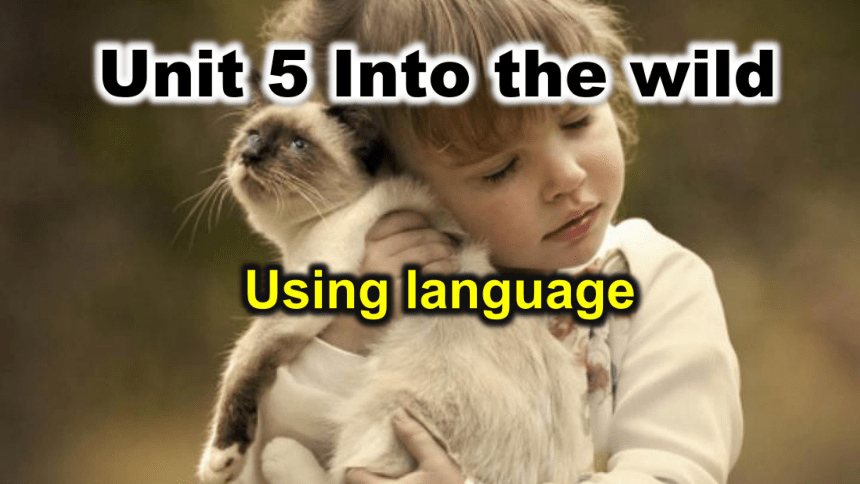 | |
| 格式 | pptx | ||
| 文件大小 | 4.4MB | ||
| 资源类型 | 教案 | ||
| 版本资源 | 外研版(2019) | ||
| 科目 | 英语 | ||
| 更新时间 | 2022-10-18 07:27:34 | ||
图片预览

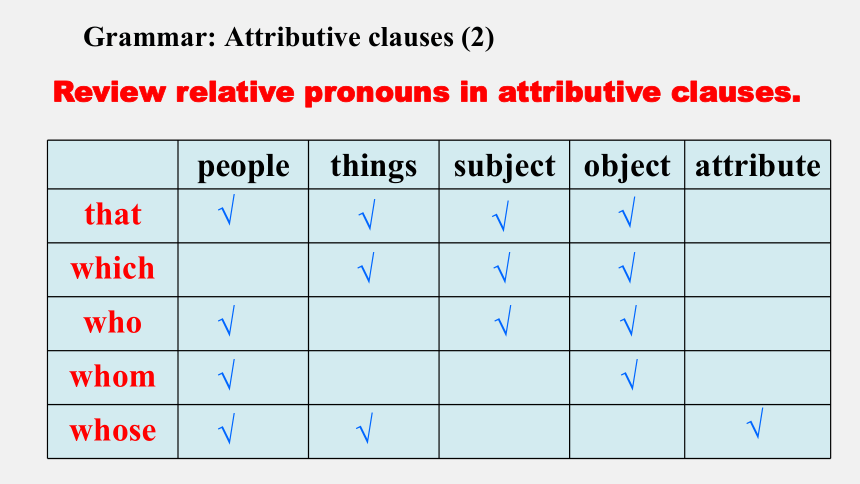
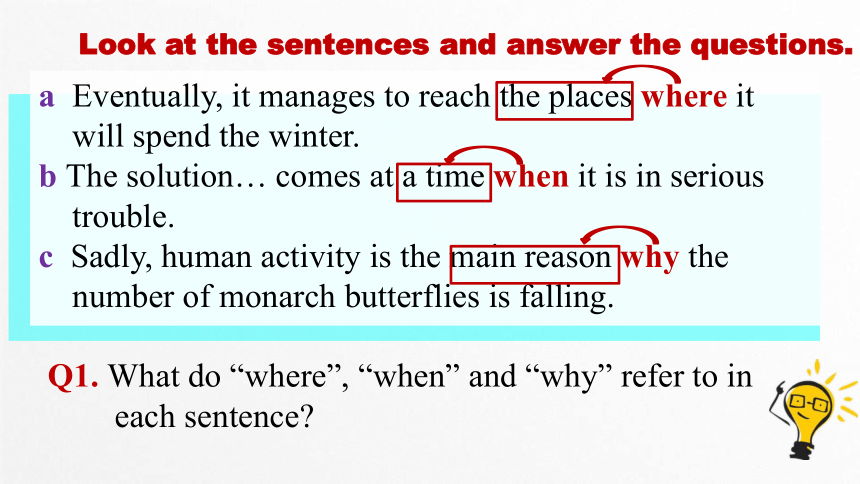
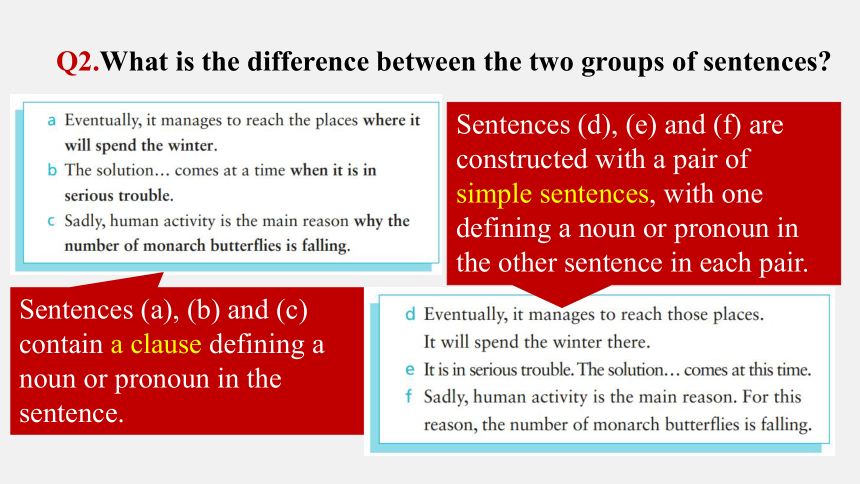
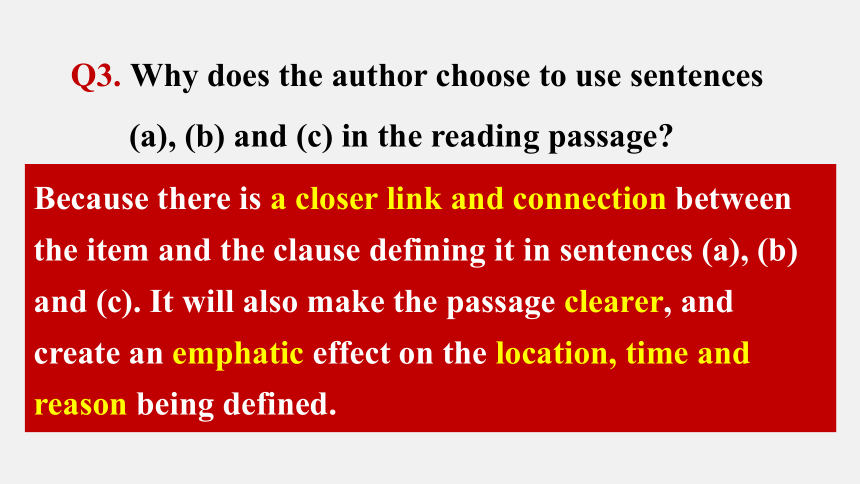
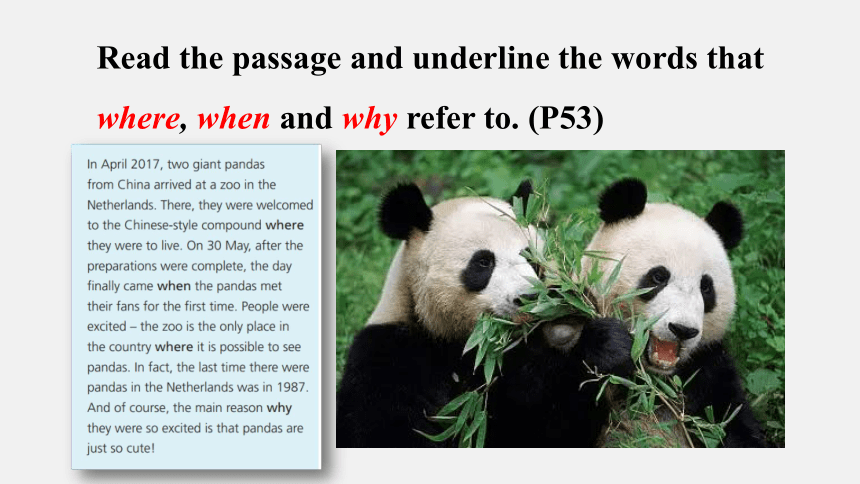
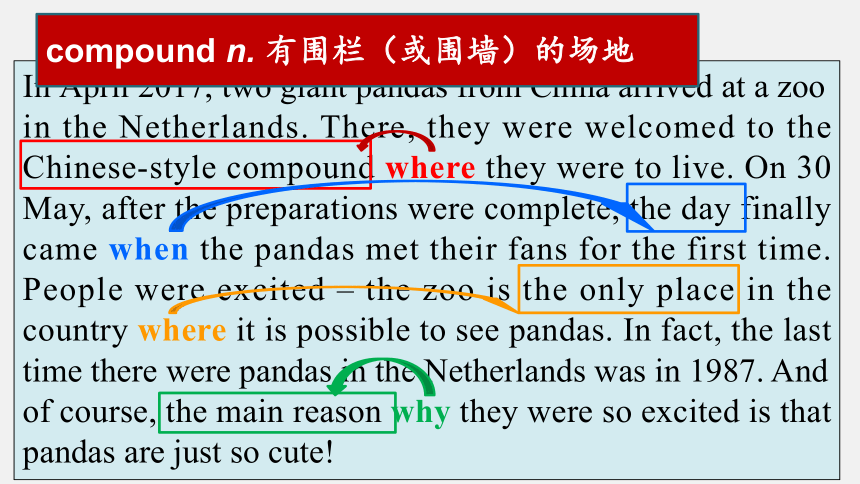
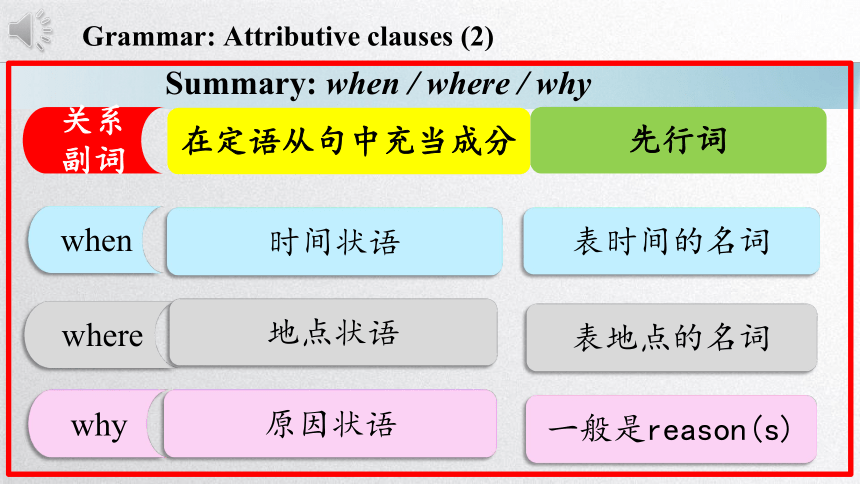
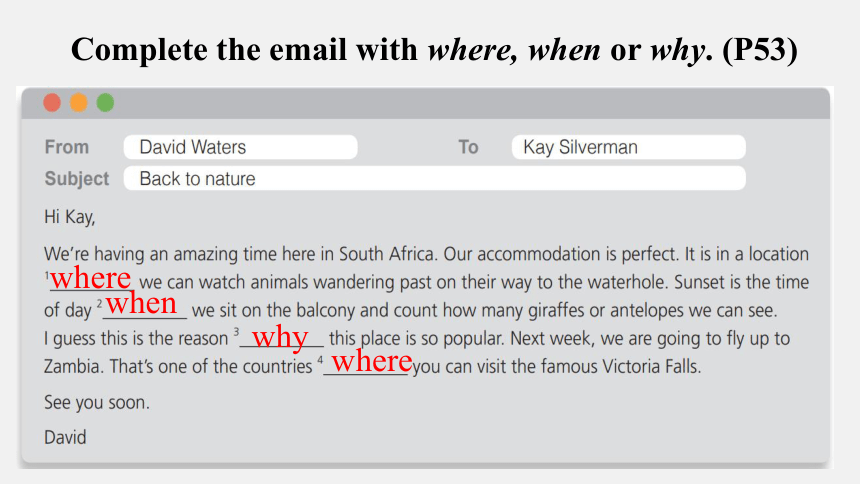
文档简介
(共26张PPT)
Using language
Unit 5 Into the wild
Grammar: Attributive clauses (2)
Review relative pronouns in attributive clauses.
people things subject object attribute
that
which
who
whom
whose
√
√
√
√
√
√
√
√
√
√
√
√
√
√
√
Look at the sentences and answer the questions.
a Eventually, it manages to reach the places where it
will spend the winter.
b The solution… comes at a time when it is in serious
trouble.
c Sadly, human activity is the main reason why the
number of monarch butterflies is falling.
Q1. What do “where”, “when” and “why” refer to in
each sentence
Q2.What is the difference between the two groups of sentences
Sentences (a), (b) and (c) contain a clause defining a noun or pronoun in the sentence.
Sentences (d), (e) and (f) are constructed with a pair of simple sentences, with one defining a noun or pronoun in the other sentence in each pair.
Q3. Why does the author choose to use sentences
(a), (b) and (c) in the reading passage
Because there is a closer link and connection between the item and the clause defining it in sentences (a), (b) and (c). It will also make the passage clearer, and create an emphatic effect on the location, time and reason being defined.
Read the passage and underline the words that where, when and why refer to. (P53)
In April 2017, two giant pandas from China arrived at a zoo in the Netherlands. There, they were welcomed to the Chinese-style compound where they were to live. On 30 May, after the preparations were complete, the day finally came when the pandas met their fans for the first time. People were excited – the zoo is the only place in the country where it is possible to see pandas. In fact, the last time there were pandas in the Netherlands was in 1987. And of course, the main reason why they were so excited is that pandas are just so cute!
compound n. 有围栏(或围墙)的场地
Grammar: Attributive clauses (2)
Summary: when / where / why
where
地点状语
表时间的名词
when
原因状语
时间状语
表地点的名词
一般是reason(s)
why
关系副词
在定语从句中充当成分
先行词
Complete the email with where, when or why. (P53)
where
when
why
where
Animal idioms
Look at the pictures and complete the idioms with animal names.(P54)
as busy as a(n) _______
kill two ________with one stone
bee
birds
忙得不可开交
一石二鸟;一箭双雕;一举两得
When the cat’s away, the _______ will play.
hold your _______
mice
horses
猫儿不在,老鼠翻天;
山中无老虎,猴子称大王
[非正式用语]且慢;请三思
It’s raining _______ and _______ .
cats
dogs
[口语]下倾盆大雨
Complete the paragraph with the animal idioms. (P54)
English idioms are a way of adding colour to the language. For example, instead of saying “It’s raining heavily”, you could say “1_____________________”. Another reason to use idioms is that they are concise. For example, to describe someone who is always working or busy doing something, we can say they are 2 ________________ .
It’s raining cats and dogs
as busy as a bee
concise adj. 简明的;简练的
If they’re rushing into something and should wait and be patient, you could say “3 ______________ ”. Learning idioms can be fun, especially when we compare them to Chinese equivalents. Take, for example, “4 ___________
_____________________ ” (people do what they want and have fun when someone in authority is absent) and
“5 ________________________ ” (solve two problems with one action) – are there corresponding idioms in Chinese
hold your horses
equivalent n. 对应词
When the cat’s
away, the mice will play
kill two birds with one stone
corresponding adj. 相应的;相关的
A: She’s as busy as a bee.
B: What makes you say that
A: She is currently doing three part-time jobs. I
haven’t seen her for three months.
Vocabulary building: Animal idioms
Work in pairs. Find more animal idioms. Choose an idiom and describe a situation with it.
sample
Debating about animals (P55)
Learning to learn
In a debate, first listen out for the main topic. This is usually a statement or question at the very start of the debate. Speakers will state whether they are for or against the statement. Then, they will introduce their supporting arguments with expressions such as We must remember that… and We can’t deny that…
While-listening
1. Can zoo animals survive in the wild
2. Can zoos offer animals their natural environment
3. Should we keep wild animals in zoos
4. Should we educate people more about animals
Listen to the TV debate and choose the correct topic.
P55
While-listening (P55)
Listen again and complete the mind map.
1. in danger of dying out
2. educate people about
animals
3. natural environments
4. depend too much on
humans
5. as good as
6. do more good for
Speaking
Work in pairs. Hold a debate on whether we should keep animals as pets.
Speaking
Work in pairs. Hold a debate on whether we should keep animals as pets.
Thank you
Using language
Unit 5 Into the wild
Grammar: Attributive clauses (2)
Review relative pronouns in attributive clauses.
people things subject object attribute
that
which
who
whom
whose
√
√
√
√
√
√
√
√
√
√
√
√
√
√
√
Look at the sentences and answer the questions.
a Eventually, it manages to reach the places where it
will spend the winter.
b The solution… comes at a time when it is in serious
trouble.
c Sadly, human activity is the main reason why the
number of monarch butterflies is falling.
Q1. What do “where”, “when” and “why” refer to in
each sentence
Q2.What is the difference between the two groups of sentences
Sentences (a), (b) and (c) contain a clause defining a noun or pronoun in the sentence.
Sentences (d), (e) and (f) are constructed with a pair of simple sentences, with one defining a noun or pronoun in the other sentence in each pair.
Q3. Why does the author choose to use sentences
(a), (b) and (c) in the reading passage
Because there is a closer link and connection between the item and the clause defining it in sentences (a), (b) and (c). It will also make the passage clearer, and create an emphatic effect on the location, time and reason being defined.
Read the passage and underline the words that where, when and why refer to. (P53)
In April 2017, two giant pandas from China arrived at a zoo in the Netherlands. There, they were welcomed to the Chinese-style compound where they were to live. On 30 May, after the preparations were complete, the day finally came when the pandas met their fans for the first time. People were excited – the zoo is the only place in the country where it is possible to see pandas. In fact, the last time there were pandas in the Netherlands was in 1987. And of course, the main reason why they were so excited is that pandas are just so cute!
compound n. 有围栏(或围墙)的场地
Grammar: Attributive clauses (2)
Summary: when / where / why
where
地点状语
表时间的名词
when
原因状语
时间状语
表地点的名词
一般是reason(s)
why
关系副词
在定语从句中充当成分
先行词
Complete the email with where, when or why. (P53)
where
when
why
where
Animal idioms
Look at the pictures and complete the idioms with animal names.(P54)
as busy as a(n) _______
kill two ________with one stone
bee
birds
忙得不可开交
一石二鸟;一箭双雕;一举两得
When the cat’s away, the _______ will play.
hold your _______
mice
horses
猫儿不在,老鼠翻天;
山中无老虎,猴子称大王
[非正式用语]且慢;请三思
It’s raining _______ and _______ .
cats
dogs
[口语]下倾盆大雨
Complete the paragraph with the animal idioms. (P54)
English idioms are a way of adding colour to the language. For example, instead of saying “It’s raining heavily”, you could say “1_____________________”. Another reason to use idioms is that they are concise. For example, to describe someone who is always working or busy doing something, we can say they are 2 ________________ .
It’s raining cats and dogs
as busy as a bee
concise adj. 简明的;简练的
If they’re rushing into something and should wait and be patient, you could say “3 ______________ ”. Learning idioms can be fun, especially when we compare them to Chinese equivalents. Take, for example, “4 ___________
_____________________ ” (people do what they want and have fun when someone in authority is absent) and
“5 ________________________ ” (solve two problems with one action) – are there corresponding idioms in Chinese
hold your horses
equivalent n. 对应词
When the cat’s
away, the mice will play
kill two birds with one stone
corresponding adj. 相应的;相关的
A: She’s as busy as a bee.
B: What makes you say that
A: She is currently doing three part-time jobs. I
haven’t seen her for three months.
Vocabulary building: Animal idioms
Work in pairs. Find more animal idioms. Choose an idiom and describe a situation with it.
sample
Debating about animals (P55)
Learning to learn
In a debate, first listen out for the main topic. This is usually a statement or question at the very start of the debate. Speakers will state whether they are for or against the statement. Then, they will introduce their supporting arguments with expressions such as We must remember that… and We can’t deny that…
While-listening
1. Can zoo animals survive in the wild
2. Can zoos offer animals their natural environment
3. Should we keep wild animals in zoos
4. Should we educate people more about animals
Listen to the TV debate and choose the correct topic.
P55
While-listening (P55)
Listen again and complete the mind map.
1. in danger of dying out
2. educate people about
animals
3. natural environments
4. depend too much on
humans
5. as good as
6. do more good for
Speaking
Work in pairs. Hold a debate on whether we should keep animals as pets.
Speaking
Work in pairs. Hold a debate on whether we should keep animals as pets.
Thank you
